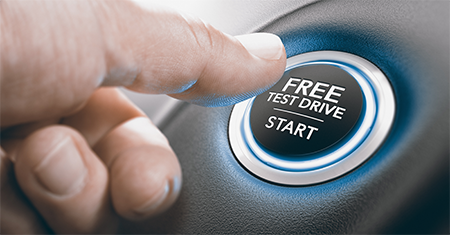Congratulations, you’ve narrowed down your car choices! Now comes the exciting part: the test drive. But before you jump behind the wheel, here’s a comprehensive guide on how to test drive a car and get the most out of this crucial step in your car-buying journey.

Preparation is Key:
How Old to Test Drive a Car:
There’s no universal age limit for sitting in a car, but dealerships typically require a valid driver’s license. Minimum ages can range from 18 to 25. Always check with the dealership beforehand to avoid any surprises (especially if you’re a young driver).
New vs. Used:
Whether it’s a brand-new car or a pre-loved gem, the test drive principles remain similar. For used cars, however, be extra vigilant. Ask about the car’s history, any repairs or maintenance, and factor that into your assessment.
Scheduling Your Test Drive:
How to Book a Test Drive:
Gone are the days of simply walking in. Most dealerships allow you to conveniently book a test drive online or by phone. Here’s how:
You can usually choose the specific car you’re interested in, select a preferred date and time slot, and fill out a short form with your contact details. The dealership will then confirm your booking via email or phone call.
Visit the dealership’s website and look for a designated booking section.

Demo Drive vs. Test Drive:
Don’t be confused! A demo drive is usually a shorter introductory ride with a salesperson at the wheel, allowing you to get a feel for the car’s features. A test drive puts you in the driver’s seat, giving you the opportunity to truly experience the car firsthand. If you’re unsure, ask the dealership to clarify what kind of drive they offer.
Making the Most of Your Drive:
How Long Should a Test Drive Be?
Aim for a 30–60-minute test drive. This gives you enough time to experience the car on various roads (city, motorways) and parking scenarios. You’ll also get a sense of how the car handles in different traffic conditions.
Can You Test-Drive a Car Without Insurance?
If you’re thinking “do I need insurance to test drive a car?” or “can you test drive a car without tax?” – Breathe easy! Dealerships typically have insurance that covers you for the test drive. You won’t need your own insurance policy. Tax, however, usually isn’t a requirement for a test drive.

Is it Worth Test Driving a Car?
Absolutely! A test drive allows you to assess comfort, handling, performance, and features – all crucial factors in your buying decision. It’s not just about the specs; is the car comfortable for long journeys? Does it have enough cargo space for your needs?
The test drive helps answer these questions and more. Don’t feel pressured to decide after one drive. Test driving the same car twice (or even different cars of the same model) can solidify your choice. The more you drive, the better you’ll understand if the car truly fits your needs.
Taking Control of Your Experience:
Extended Test Drive:
Some dealerships offer extended test drives, sometimes called 48-hour test drives. This allows you to experience the car in your daily routine, giving you a more realistic feel for how it will integrate into your life.
Beyond the Basics:
Don’t be afraid to ask questions! The salesperson is there to help. Push buttons, explore every feature, and get comfortable with the car’s technology. Pay attention to details like blind spots, ease of use of controls, and how much road noise enters the cabin.
By following these comprehensive tips, your test drive will be a productive and informative experience. You’ll be in control and well-equipped to make an informed decision, ultimately finding the perfect car for you!